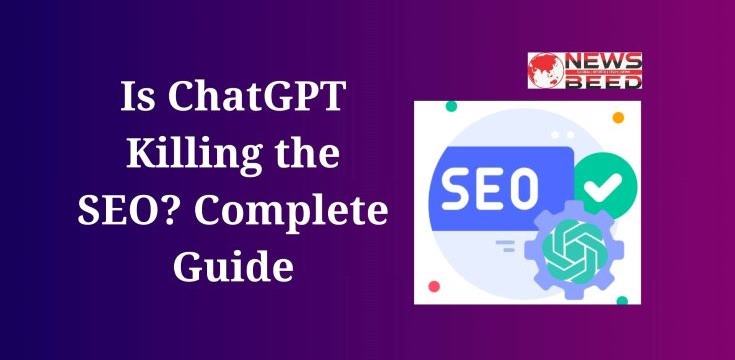The evolution of artificial intelligence (AI) and natural language processing (NLP) technologies has brought about a significant transformation in the way digital content is generated, consumed, and ranked on search engines. ChatGPT, a cutting-edge AI language model, is at the forefront of this revolution, raising questions about its influence on Search Engine Optimization (SEO) practices. In this comprehensive guide, we will explore the intricate relationship between ChatGPT and SEO in the context of the year 2023 and project potential implications for the future. ChatGPT Killing the SEO.
Understanding ChatGPT
ChatGPT, developed by OpenAI, is an advanced language model that uses deep learning techniques to generate human-like text. It is capable of understanding context, answering questions, and generating coherent and contextually relevant responses. ChatGPT is powered by the GPT-3.5 architecture, which makes it a powerful tool for various applications, including content creation, chatbots, and customer support.
SEO Fundamentals
Before delving into the impact of ChatGPT on SEO, it’s crucial to understand the foundational principles of SEO. SEO is the practice of optimizing digital content to rank higher on search engine results pages (SERPs). Key aspects of SEO include keyword research, on-page optimization, backlinks, and user experience. The goal is to increase organic traffic and visibility on search engines like Google.
Also, Read This: What is Digital Marketing in Hindi
The Role of Content in SEO
Content is the heart of SEO. High-quality, relevant, and engaging content not only attracts visitors but also helps in ranking on SERPs. Traditional SEO strategies involve creating content tailored to specific keywords and optimizing meta tags, headers, and images. This approach aims to satisfy user intent and provide valuable information. Is ChatGPT Killing the SEO.
ChatGPT as a Content Generation Tool
ChatGPT has gained attention for its ability to generate content swiftly and efficiently. Marketers and content creators are utilizing ChatGPT to streamline content production processes. However, there are concerns about the quality and uniqueness of AI-generated content. To maintain SEO integrity, content generated by ChatGPT should be carefully curated and edited to align with SEO best practices.
The Impact on Keyword Research
Keyword research is a fundamental aspect of SEO. With ChatGPT, keyword research can become more data-driven and efficient. ChatGPT can analyze vast amounts of text data to identify emerging keywords and trends, helping SEO professionals stay ahead of the competition. However, there is a need for human oversight to ensure that AI-generated keyword suggestions align with business goals and target audience interests.
SEO Content Creation and ChatGPT
ChatGPT can assist in the content creation process by generating drafts, blog posts, product descriptions, and more. While this expedites content production, it also poses challenges related to originality and uniqueness. To maintain SEO integrity, content generated by ChatGPT should be customized, reviewed, and optimized by human writers to ensure it aligns with brand messaging and SEO objectives.
User Experience and SEO
User experience is a critical factor in SEO rankings. Search engines prioritize websites that offer a positive user experience, including fast loading times, mobile-friendliness, and intuitive navigation. ChatGPT can contribute to user experience by powering chatbots and virtual assistants that enhance website interactivity. This, in turn, can positively impact SEO rankings.
The Role of Chatbots in SEO
Chatbots, powered by ChatGPT, play a significant role in customer engagement and support. They can answer user queries, guide them through the website, and provide personalized recommendations. This enhances user satisfaction, reduces bounce rates, and improves dwell time—all of which are SEO ranking factors.
Backlinks and ChatGPT
Backlinks, or external links pointing to a website, are a crucial aspect of SEO. ChatGPT can assist in identifying potential link-building opportunities by analyzing online content and suggesting relevant outreach targets. However, the quality and authenticity of these links must be carefully assessed to avoid potential penalties from search engines.
Challenges and Ethical Considerations
As ChatGPT continues to influence SEO practices, it raises ethical concerns. The use of AI-generated content raises questions about transparency, plagiarism, and the potential for misinformation. SEO professionals must navigate these challenges while upholding ethical standards and maintaining trust with their audience.
Future Trends and Predictions
The future of SEO in the era of ChatGPT holds several exciting possibilities. AI-driven SEO tools will likely become more sophisticated, offering real-time insights and automation. However, human creativity and expertise will remain invaluable in content strategy, optimization, and ethical decision-making.
Read Also:- Android All Versions Names and Launching Date
Conclusion
ChatGPT is not “killing” SEO but rather reshaping and enhancing it. While AI and NLP technologies like ChatGPT bring efficiency and innovation to SEO practices, they also pose challenges related to quality control, ethics, and user trust. SEO professionals must adapt to these changes by leveraging AI tools strategically, while continuing to provide unique, valuable, and user-centric content. In this evolving landscape, a harmonious coexistence between AI and human expertise will be key to SEO success in 2023 and beyond.




